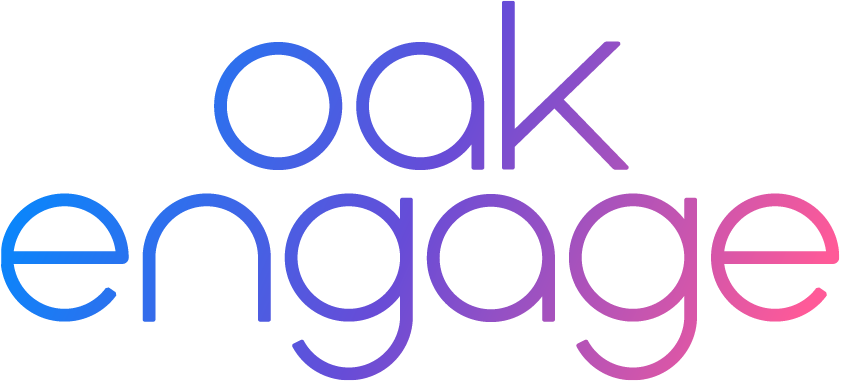Survey shows half (50%) of remote workers feel more isolated and lonely working from home
Over a third of remote workers (35%) admit that working from home has dramatically affected their mental health
Half (50%) of remote workers feel disconnected from the rest of the business working from home
At Oak Engage we conducted a survey of more than 1,200 remote workers and found that half (50%) of remote workers feel more isolated and lonely working from home, with young workers (those aged 16-24) most likely to be affected.
The survey also shows that over half (53%) of younger remote workers (aged 16-24) admit working from home has dramatically affected their mental health compared to just over 1 in 5 (21%) of remote workers aged 45-54. More than twice as many remote workers aged 16-24 agree that working from home has made them unhappy than those aged 45-54 (41% vs 17%).
The pandemic has forced many of us to adapt to remote working but it definitely comes with its challenges. The main ones being; work life balance (28%), loneliness (24%), isolation (24%), increase in virtual meetings (20%) and lack of communication (19%).
As a result, many businesses need to adapt their practices to help better support their employees and provide connection during this challenging time. Oak Engage and Healthy Workplace Culture Specialist, Lisa Seagroatt shares top tips on how to combat loneliness and increase happiness this Loneliness Awareness Week.
Focus on your goals
Having clear goals will give you a sense of accomplishment. When satisfaction increases, motivation follows and this boost in positivity can help fight the feeling of loneliness.
Lisa comments: “Show your employees they are valued, helping to boost morale. Get together over a cuppa and cake and keep your communication upbeat and regular as part of normal workplace culture. Even if the work ahead looks tricky, seeking input and involvement from your employees will encourage people to feel motivated, impacting positively on everyone’s mental health and wellbeing.”
Take advantage of flexible working
Take advantage of your flexible working pattern, if you have one and make time to socialise during the work week in ways you wouldn’t be able to do if you worked in the office. If you’re unsure, check if one is available to you from your workplace. Whether it’s grabbing coffee or lunch with a friend or taking your dog for a walk, this will give you more control over your workplace and have a positive impact on your wellbeing and mental health.
Speaking of her own experience, Lisa adds: “Having experienced difficulties with my own mental health, I know how important it is to get out, everyday if you can, whilst working from home. Even if you don’t meet up with someone, just being amongst people helps to lift your mood. My office is home based so I make time to get out for a walk each morning and schedule in coffee breaks, away from the home when possible. You will feel so much better for being out in the fresh air or just in a different environment as it helps to recharge your mind essentially!”
Work outside of your home once a week if you can
Get out of your home office and surround yourself with people to feel more connected. You might not speak to many other people but just getting out of the house might help you feel like you’re part of a bigger community. Reach out to other remote workers living in your area and schedule a meet-up.
Lisa comments: “I’m a great advocate of the benefits of ‘getting out for coffee’ and often work better in a noisy and bustling coffee shop than I do in my quiet office. The busyness and energy you absorb working in a different environment not only helps break up the monotony of the working week but it gives your mental health a boost. You never know who you might meet in the same boat as you – or you may make new friends and meet new clients!
A positive working environment
Employers also need to create a positive working environment and encourage their people to reach out and interact with each other.
Will Murray, CEO at Oak Engage said: “Recognition is a key motivator and provides people with a sense of accomplishment. Appreciation makes employees feel more confident and improves productivity, a simple thank you goes a long way. Initiatives such as days without meetings and mental health days also play a huge part in creating a positive working environment. We offer holidays whenever people need them and ‘Oak Bank Holidays’ to ensure employees are getting the rest they deserve.”
On culture, Lisa adds: “Every single one of us has both mental as well as physical health needs. The only difference is that physical health needs are often more obvious so it’s important for employers to create a culture where employees feel able to seek support when they need to. Business leaders and people managers play a key role here in ensuring they create working environments where employees feel ‘safe’ to raise any issues linked to mental health. A healthy workplace culture of openness, transparency and good communication from the top down helps to create safe working environments.”
Will Murray, CEO at Oak Engage comments: “Two of the main challenges working from home are isolation and lack of communication. The current tools that businesses are using to connect with their staff just aren’t cutting it. That’s why organisations are looking for new solutions to engage their employees.”
“Products like Oak Engage’s intranet can help businesses connect their people by using targeted and personalised communications to boost employee engagement and promote wellbeing. Today’s teams need a new way to communicate that targets fatigue in the new hybrid workplace, whilst continuing to keep the richness of face-to-face and that is what we’re focussed on.”



